World War 2 could learn something from Ukraine
The war in Ukraine is going well enough. It could have been much, much worse.
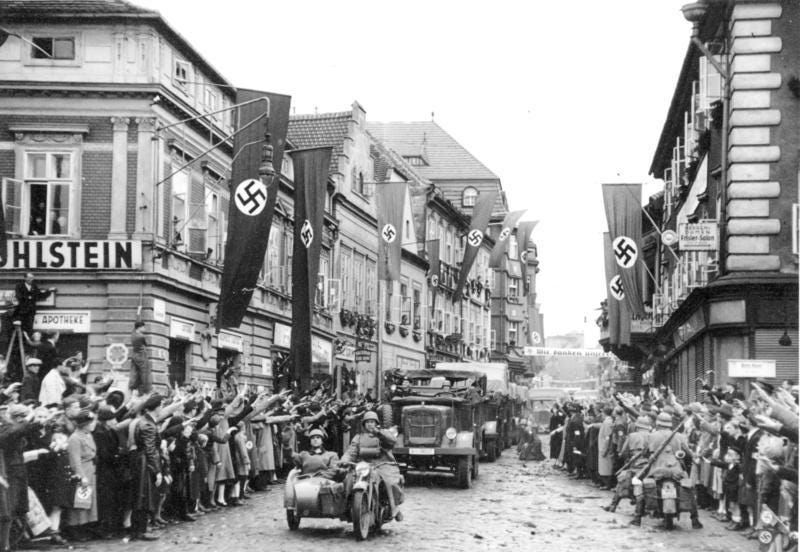
These days a whiff of defeatism seems to be setting in around the war in Ukraine. Last year's Ukrainian counter-offensive was something of a fiasco. Russia is once again ascendant on the battlefield. And both the EU and the US seem unable to keep up the current level of support.
While the situation might not look great it is worth remembering that it is not particularly bad either. Ukraine is not about to fall. Russia is as isolated as always. And, most of all, the world has not collapsed.
Looking back to February 2022, the current situation is nothing less than a thunderous success. In February 2022 most observers, myself included, believed Ukraine would fall relatively quickly. The question was mostly about how much of a bloody nose they could inflict on the Russians before folding.
In those early days after the invasion there was also the issue of avoiding a greater war. Something that had been made chillingly clear by Vladimir Putin in his invasion speech of 24 February where he stated that anyone interfering in Russia's invasion would face "consequences such as you have never seen in your entire history", a not very veiled threat of nuclear weapons.
The upside here is that no one has used nuclear weapons in Ukraine (yet). Despite this nominal non-interference in Russian business, Russia has still not achieved any of its objectives. This is in stark contrast to another invasion, that started another war, some 84 years ago.
The not so great generation
In the summer of 1939 the world was waiting for Germany to invade Poland (something I wrote about here). Then Germany invaded Poland. Most history books cover the rest: Britain and France, who had promised they would defend Poland in case of German attack, declared war on Germany and the world spent the next six years in an orgy of violence inapprehensible in its magnitude and scope.
The good guys won World War 2, which generally qualifies it as a successful war. But this simplified reading of history misses some significant nuances. For example, did World War 2 need to take place at all?
Most people seem to assume that since Hitler was practically insane a major war was inevitable and could as well come sooner rather than later. I believe this interpretation is mostly crap. And I believe the Ukraine War is proving my point. Today's statesmen and diplomats are much defter than their colleagues in the 1930s. Thanks to them we have peace instead of war. Something which they are not given due credit for.
What the West has done right in Ukraine
You do not start a war unless you hope to gain something from it. And you can only gain something from it if you gain more than you lose. If you want to deter an opponent from taking military action all you need to do is convince them that the cost of war is higher than the eventual gains.
No one knows Russia's objectives in Ukraine. But we can be quite certain that the losses incurred by the Russian military are higher than anticipated. Most probably Putin would not have ordered an attack if he had known or predicted the perseverance of the Ukrainian defenders.
Western intelligence services probably had a much better picture of Ukrainian defensive abilities than their Russian counterparts. After all, Western intelligence seemed to know almost to the date when Russia would invade, disclosing a surprisingly sophisticated intelligence operation in Eastern Europe.
This superior intelligence most probably led to better judgments in the days before and after the Russian invasion. Before the invasion the West sent portable anti-tank systems, precisely what was needed to slow down and degrade an armored attack. After the invasion the West sent all manner of things, but mostly ammunition and everything else needed for Ukraine not to run out of supplies during the months when it transitioned to a war economy.
No one yet knows how the Ukraine War will end. Maybe Russia will eke out something akin to a win for them and a loss for Ukraine, for example by signing a peace treaty where Ukraine gives up significant portions of its pre-war territory.
Such a victory will be great news for Vladimir Putin. But it will not matter that much to Russia. Or the world. No matter what the peace treaty says the war will still have cost Russia much more than it gained. The victory will be a Pyrrhic victory. Russia will be weaker after the war than before the war. Not only will this lessen the risk of future Russian aggression, it will also send a message to other potential aggressors that violence is not the right way. This is a win for humanity.
What the West did wrong in Poland...
Contrast this with Britain's and France's attitude towards Poland in 1939. The Western powers did declare war on Germany. But apart from a token French offensive into German Saarland, Poland received no help whatsoever.
In fact, it is not that difficult to argue that the British and French declarations of war made Poland's situation worse rather than better. This line of thinking is generally not followed today. Poland's fate during World War 2 is mostly forgotten. History is written by the winners and the winners in this particular war had good reason to be ashamed of what happened to Poland.
Poland in 1939 was no minnow and even if Germany had the upper hand in most areas a German invasion would be no walk in the park. Poland had 35 million inhabitants compared to Germany's 69 million. Germany's economy was five times larger than Poland's but Poland had a large and well-trained army (France had a permanent training mission in Poland since 1918).
Just looking at the numbers it is easy to see that Russia vs. Ukraine in 2022 is more tilted in Russia’s favor than Germany vs. Poland in 1939 was tilted in Germany's favor. Considering that Germany finished off Poland in not much more than a month, Russia’s problems are unexpected. To be fair, Germany in 1939 surprised the world with its military efficiency, especially its new Blitzkrieg tactics, to which the Poles had no ready antidote. Russia has hitherto only surprised the world with the incompetence of its army.
The French and British always had an uphill struggle in protecting Poland. For the very simple reason that they are on the wrong side of Germany. It was difficult to dispatch troops to aid the Poles (but not impossible, exactly how difficult we will not know since no one tried). They could of course attack Germany from the west, but France, still war-weary from World War 1, feared the losses a major land offensive would have incurred. Britain had the ability to bomb large parts of Germany, but they chose not to in order not to provoke German reprisal bombings. In the end, the declarations of war were mostly for show, with the tiny exception that the genie of war was now out of the bottle.
...and what they should have done
Britain and France were fickle allies of Poland, more interested in containing Germany and upholding the balance of power than they were in the welfare of Poles. However, Poland had a real ally as well: Romania. When the Germans attacked, Romania offered to, and were obliged to, send troops to aid Poland. But the Poles declined. They preferred the Romanians to be friendly neutrals rather than military allies. This says something about what Poland really needed in September 1939.
The German attack on Poland was expected, and Poland had prepared as best as it could. The Poles were also aware of their shortcomings, especially their significant air force inferiority. They tried to remedy this by ordering hundreds of modern planes from Britain and France during the summer of 1939. When the Germans invaded on 1 September there was actually a British ship filled with fighter planes steaming towards Poland. It turned back. Naturally, a British ship could not go to the Polish ports in the Baltic where German naval ships roamed freely.
The incident with the fighter planes shows a very real disadvantage with the British and French declarations of war: They could not give any meaningful aid to Poland since they were themselves belligerents and Germany's geographical position was such that it could intercept all incoming deliveries.
An even greater weakness with war was the war itself. War was something of the nuclear option of the 1930s. When you had declared war there was not much else you could do. This might not have affected Germany very much but it most probably affected the behavior of another regional power: the Soviet Union.
The Soviet Union invaded Poland 16 days after the German invasion. Nominally they intervened to protect Russian and Ukrainian minorities after the collapse of the Polish state. In reality, Hitler and Stalin had divided Eastern Europe into spheres of interest and now the Soviets moved in to take control of their part.
Why did the Soviets not invade Poland already in August, when the pact with Germany was signed? Because they did not dare. Taking on the Polish army by themselves might have been more than they could bite (after all, Poland had repulsed a Soviet invasion in 1920). More than anything, an invasion of a neighboring country would have had political and diplomatic consequences. But Stalin calculated that the Western powers would be fully occupied with their war with Germany and not in a mood to take on the Soviet Union as well. He was right, the only diplomatic consequence of the Soviet invasion of Poland was some non-committal condemnations.
Poland - First to fight
The line of reasoning this far is that Poland was worse off by the French and British declarations of war. There is no way to prove this definitively, but there are several clues. One is the swift collapse of Poland in September 1939. Today it is more or less taken for granted that this should happen. But that was not the view in 1939 and it need not have been like that.
The Poles were at a significant disadvantage compared to Germany. But they were not destined to be steamrolled by the Wehrmacht. In 1939 Poland at least had a plan. They realized they would probably not be able to resist a German attack for very long, instead they intended to retreat towards the southeast, where the topography favored defense. Here, Poland had constructed multiple fortifications and placed stores of military supplies. Even more importantly, this was Poland's border with Romania, giving easy access to supplies from Romania's Black Sea ports.
Poland followed this plan well during the early parts of the German invasion. The Germans advanced much quicker than anticipated but the Poles retreated towards the Romanian border in good order. Then the Soviets attacked from the east and more or less cut off the Polish connection with Romania and the wider world. The Polish defense plan collapsed entirely.
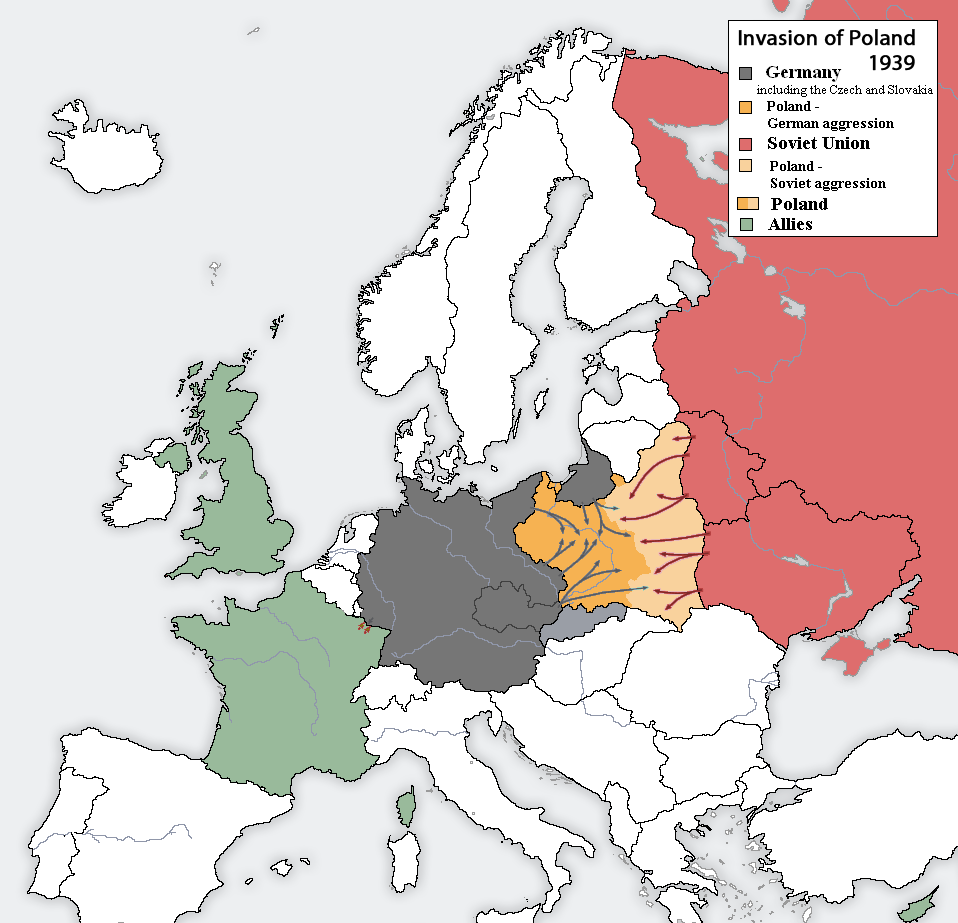
In reality Poland did not collapse entirely. Nor did the Polish state cease to exist. Far from it. Despite the Soviet attack in the rear significant portions of the Polish army retreated into Romania. The Polish government and the entire Polish gold reserve also made the escape to Romania and on to France. There they reconstituted their armed forces and continued fighting under their own government financed with their own resources. The state of Poland was an asset to the allies long after the country of Poland had ceased to exist.
Doing too much or too little
For Germany the Polish campaign was a great success. It was, of course, a victory. But more than that it was short and yet no walkover. The Germans lost 17,000 soldiers killed during the invasion of Poland. This was only a little less than the 27,000 German soldiers who lost their lives during the invasion of France and Benelux the following year.
A short but intense war gave the German army invaluable experience. Experience they could use to great effect when they attacked westwards in 1940. The shortness of hostilities meant that Germany could quickly return to building up its forces and incorporating the new knowledge they had acquired during the Polish campaign.
The Germans clearly benefited from the outcome in Poland despite the Western powers' declarations of war. But what would have happened had Britain and France been more forthcoming towards Germany? We know the answer to that question since this is precisely what happened to Czechoslovakia.
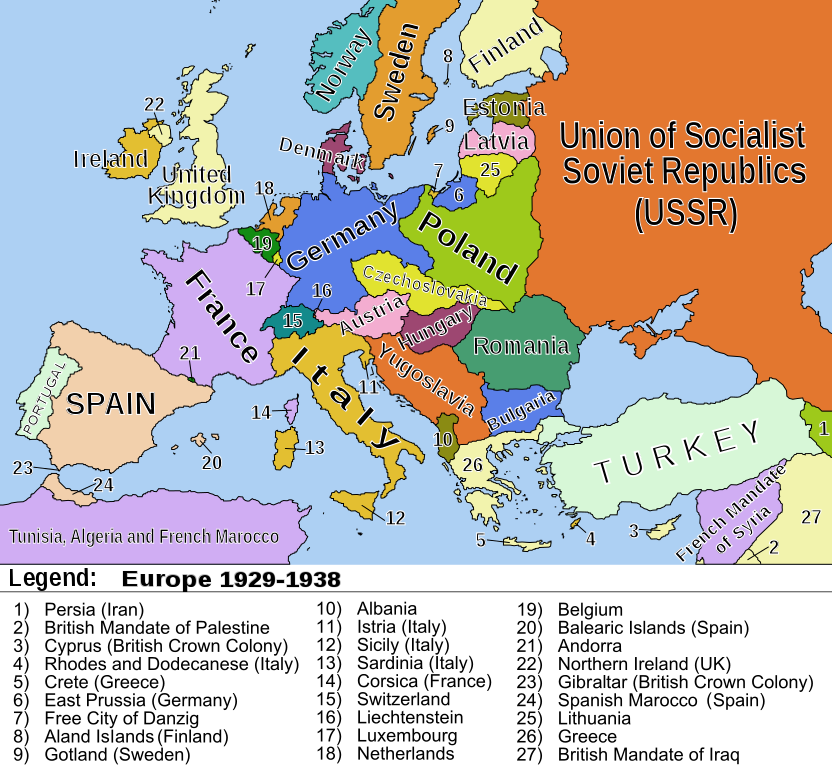
Almost exactly a year before the Polish invasion, in September 1938, Germany was on the cusp of invading Czechoslovakia, another German neighbor with a significant German minority. Germany waged a hybrid war (although the term was not invented then) by arming and supporting ethnic German paramilitary groups in Czechoslovakia. This hybrid war was quite intense with casualties counted in the hundreds during a few weeks in September.
To defuse the situation the great (European) powers of the day: France, Britain, Italy and Germany - assembled for a conference to decide the fate of Czechoslovakia. Without consulting the Czechoslovaks they decided that Germany's demands were legitimate and ordered Czechoslovakia to hand over all German-majority areas to Germany. This was the infamous Munich Agreement.
Faced with a German army ready for war right across the border and abandoned by their friends and allies, the Czechoslovaks thought it best to comply. They evacuated the ethnic-German border lands after which German troops and administrators moved in. This proved deeply demoralizing for Czechoslovakia and just six months later the German army moved into the rest of Czechoslovakia unopposed, nominally to aid the Slovaks who yearned for freedom from the Czech yoke, but in reality to annex the rich lands of Czechia and especially its very productive arms factories.
Back to alternate history
The appeasement of Hitler in Munich and the forced dismemberment of Czechoslovakia it led to was clearly a win for Germany[However, it was not necessarily a loss for Czechoslovakia. It is easy to argue that the German annexation of Czechoslovakia was in fact great for the Czechoslovak population. Had they resisted and the Germans had attacked, their land would surely have been devastated. As it was they became a part of the German Reich, but in many ways one of the best parts. Since they were not German the Czechs were not conscripted into the army. The Czech lands were highly industrialized and valuable to the Germans which meant they had to keep the population complacent and productive by not starving them too much. Czechoslovakia was also too far away from Britain to be bombed and since the Soviets focused on Germany the Czech lands were never invaded and were thus spared almost all the destruction of war.]. Not only was it a great morale booster for the expansionist German regime. It also gave Germany a significant economic boost. Czechoslovakia was at the time one of the richest countries in the world and its industries, especially its arms industries, were world-renowned.
Even the Western powers saw the Munich agreement, and especially the later German invasion of Czechoslovakia, as a win for Germany. This was a cause for embarrassment for the French and British leadership and immediately led to a significant change of attitude. On 31 March, a fortnight after German troops rolled into Czechoslovakia proper, the British signed the alliance with Poland where they promised to come to its aid in case of German attack.
First too little and then too much. But what would have been the right level of resistance towards an aggressive actor like Germany?
The Ukraine model can be summed up as using everything to counter an aggressor except outright warfare: economic sanctions and diplomatic boycotts against the aggressor and financial and military assistance to the victims of the aggressor.
Today it is often lamented that the Czechoslovaks were never allowed to use their military to defend themselves against Germany. The Czechoslovaks had a powerful military and strong fortifications along the border. And in 1938 the German army was significantly weaker than in 1939.
This is mostly wishful thinking. The Czechoslovaks had a good army, but so did Poland. Poland was three times the size of Czechoslovakia and was still no match for Germany. Given that a fifth of the Czechoslovak population were well-organized ethnic Germans that would have acted as a gigantic fifth column the Czechoslovak prospects looked glum. Especially since, with the annexation of Austria, the Germans could attack Czechoslovakia from its relatively un-fortified south.
Forcing Germany to attack Czechoslovakia militarily had thus not changed the nominal outcome, Czechoslovakia would have become German. Still, many things would have been different. By fighting, the Germans would have lost both soldiers and arms. German soldiers and German arms, but even more they would have lost the significant stores of Czechoslovak military equipment they conquered in 1939. Had the Czechoslovaks really resisted their country would most likely have been destroyed. Its industries, especially its arms industries, would have been bombed to pieces which, in the end, would have been a German loss.
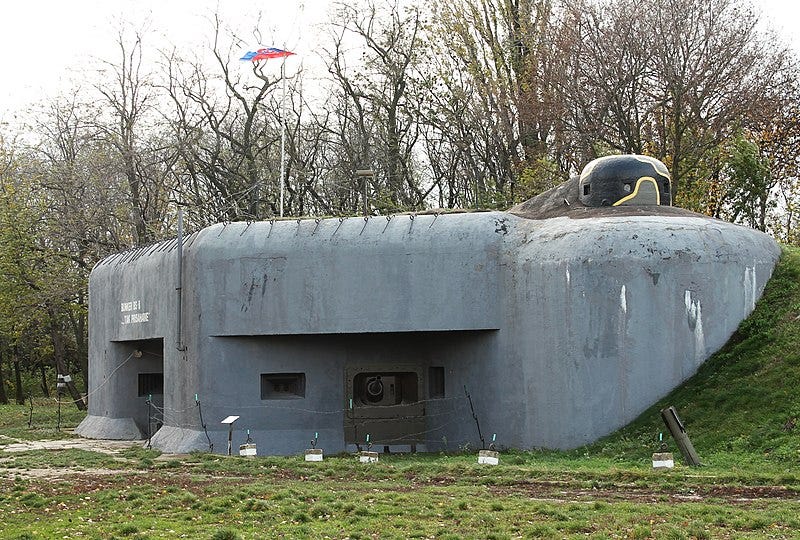
An even greater German loss would have been economic sanctions from the Western powers. This was the only effective action against Germany in September 1939. When declaring war on Germany, Britain and France also set up a naval blockade on Germany, something that was very effective since Germany lacked most raw materials.
In the real world this naval blockade proved ineffective since Germany's alliance with the Soviet Union included articles about trade which allowed Germany to tap the vast Soviet resources, most importantly food and oil. Thanks to this the German army could continue rolling (at least until the disastrous German attack on the Soviet Union) despite the sanctions.
In 1938 Germany had no trade agreement with the Soviet Union. Such an agreement would have been of limited value anyway since Poland, hostile to both Germans and Russians, lay in the way and would not have let much trade pass. An economic blockade, especially of oil, would therefore have been very effective. It would probably not have saved Czechoslovakia but it would have severely limited Germany's ability to wage any longer war.
The Western powers would not have been able to aid Czechoslovakia with weapons in any meaningful way, Czechoslovakia being landlocked and surrounded by enemies. But it would not have mattered much anyway since Czechoslovakia was a large arms exporter and was as well supplied with weapons as anyone.
Had Germany in this alternate history continued to attack Poland as well the Western powers would have been in a good situation to offer direct aid. Without a general war the Soviet Union would probably not have dared to intervene and then the Poles could have retreated to their southeastern holdout. France and Britain would then have been able to ship in large volumes of weapons through Romania. This might not have prevented a complete Germany victory, but that victory would have been much dearer to Germany and the board would have been set for a protracted guerilla war, armed and funded by Britain and France and waged from bases in Romania.
Costly wars were something that Germany in the 1930s could not afford. The country was more or less broke, having invested all spare assets in their armed forces. Even had they overcome Czechoslovakia and Poland these victories would have meant nothing if they had lost more than they profited from them. And after the victories they would have found themselves in economic boycott and diplomatic isolation. Their room for maneuver would have been severely restricted and most probably the German population would have started asking questions as to whether the expensive wars had really been worth it.
Lessons learned
Western support to Czechoslovakia and Poland would most probably not have saved these countries from German aggression in the 1930s. Just as Western support may not be enough to save Ukraine from its rapacious neighbor today.
However, the main point in this article is that this does not matter. At least not for the bigger picture. For Ukraine it is of course a catastrophe to be invaded by Russia and an even worse catastrophe to capitulate after a long and ruinous defense. Just as it was an unmitigated disaster for Poland to be invaded and occupied by Germany in 1939.
But for the world the only thing that matters is that the aggressor loses more from military action than they gain. This is certainly true for the Ukraine War. The war might have been a disaster for Ukraine, but it is also a disaster for Russia. Even if the Russians eke out a win in the end they will be weaker at the war's end than at its start. Not only does this limit Russia's abilities to invade other countries, it also serves as a signal to other potential aggressors to think twice before they act.
This is undoubtedly a win for the international community. It is also very well played by the Western powers. Despite Putin's warnings not to intervene the West has succeeded in helping Ukraine by slowly ratcheting up the support for Ukraine and the sanctions on Russia without the Russians being able to declare that any red lines have been crossed. This has placed Russia in a very uncomfortable place. Bogged down in a war it cannot end, slowly strangled by sanctions it cannot lift and diplomatically locked in a position from where it can neither advance, nor retreat, Russia is facing the abyss.
The Russian invasion of Ukraine is eerily similar to the German invasion of Poland. The invasion of Ukraine also had the potential to develop either like the German annexation of Czechoslovakia, where the west sold out a friendly country, or the invasion of Poland, which developed into a world war to the detriment of everyone. That the world has avoided both of these scenarios is a great victory and should be treated as such.
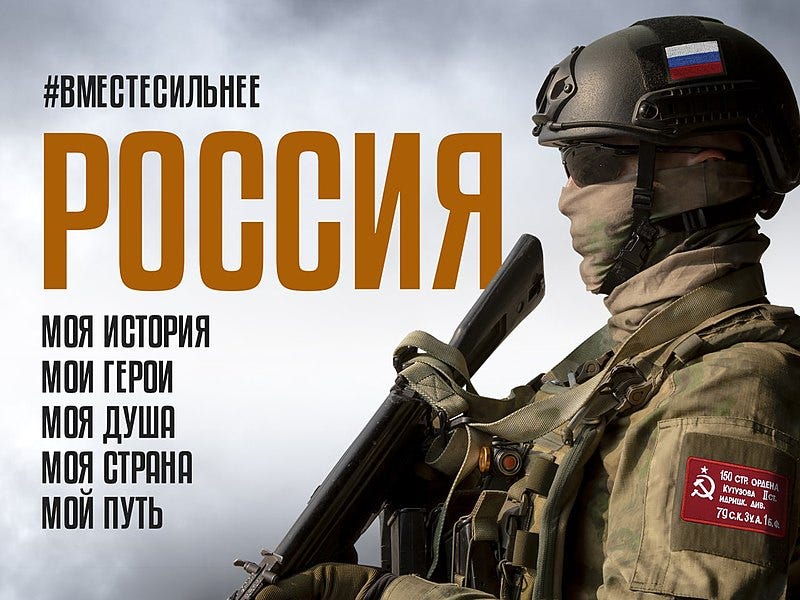

This was challenging, educational and informative to read, thanks! It definitely made me appreciate the last two years differently. I look forward to your posts, keep them coming.
Thanks for this — but I don't buy the idea that Poland was as well placed against the Germans as Ukraine was against Russia today. Throughout WWII the Germans did twice as much damage to their opponents than was done to them in pretty much every land battle they fought. They were a ferocious and phenomenally effective enemy in battle with a brand new strategy — blitzkrieg. The Russians in 2022 — not so much.